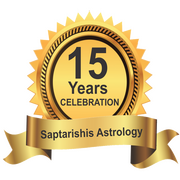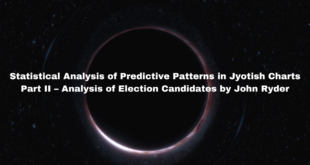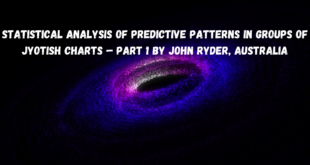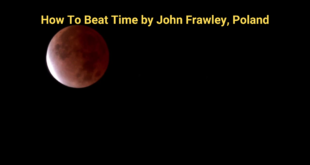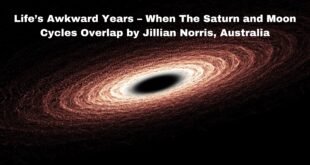Article By Margaret George
What is the Celtic connection between western astrology and Vedic astrologer BV Raman?
Only a hint of Irish brogue enters the conversation with Bill Sheeran, who explains he was born in England in early 1950’s after his parents emigrated from Ireland leaving him with little exposure to the Celtic accent you would normally expect from a native of the emerald isle. Bill’s parent’s left their homeland for better things at a time when the island was anything but the thriving economy which characterizes it today. In 1977 Bill made the reverse journey to the land of his ancestors, and has been living there ever since.
“While I was living in England, I never really felt I belonged there. I always enjoyed holidays visiting relatives in Ireland and became very interested in all things Irish from a young age. When I moved to Galway to take up a research position in the university’s microbiology department, it was like returning home. On the other hand, with my English accent and absence of an Irish education and cultural conditioning, this sense of belonging was counterbalanced by the feeling that I was to some extent an outsider. Strangely, I feel this same tension as an astrologer who was once a scientist! I have a practically based familiarity with both sides of the conflict, as it were.”
Bill works from his office in Dublin, but currently splits his time looking after ageing parents, who returned to County Wexford in the 1980s. While this limits the time available for his consultation work, it doesn’t impose any constraints on his research and writing projects, which Bill sees as the primary vehicles for his creative energies.
So how did he make the switch from microbiology to astrology?
“It was a series of coincidences. A group of us from the lab were celebrating the birthday a co-worker. The conversation turned to sun signs, and it became clear that three of the group were Librans. It struck me that they had one characteristic in common – indecisiveness. A couple of weeks later I came across a slim introduction to astrology, part of series of introductions to all sorts of hobbies and crafts. Out of curiosity, I flipped though the pages, and noticed a list of key words for planets in signs. The second or third word in for Sun in Libra was ‘indecisive’. So I bought the book, and quickly realised that there was a lot more to astrology than newspaper horoscopes would lead one to believe!
The key text which finally persuaded me to take astrology seriously was ‘Planets in Transit’, by Robert Hand. I came across this book after a year or two of hobbyist level engagement with the subject. A few months previously, I had left science and was now running a small retail business. To my amazement, I discovered that this sudden change in career direction coincided with Uranus moving over the Midheaven and into the 10th house of my horoscope. The text read “During this transit it is quite likely you will experience a change in your career path”, or words to that effect. From then on I was hooked.’’
Bill finally made the jump from studying astrology to practising as an ‘apprentice astrologer’ in 1986, seven years after that laboratory birthday party. A meeting with a professional astrologer while on a trip to Australia convinced him to follow the path which led him to his vocational career.After three or four years of full time chart interpretation work, Bill brought the training in critical thinking from his years as a scientist to bear on the question of astrology’s nature and predictive capacity. He was convinced from his experience as an astrologer that astrology can’t be explained in terms of mechanistic causation mediated by planets. At the same time, he was equally convinced that astrology has a value as a predictive tool. He lectured and wrote articles on the relevance of the emerging theories of chaos and complexity for predictive work. The emphasis was on the need to take into account the internal, non-astrological dynamics of the context under consideration in order to optimise astrologically derived predictive statements.
Currently, Bill’s research centres on how humans construct conceptual systems such as astrology, and the relationship between human cognition and astrological processes. This has relevance for topics such as why astrology has the forms it does, what the horoscope actually represents, where the meaning comes from in astrology, and how astrology can generate insights additional to those based on common sense and rational analysis.
In a sense I discern that like many astrologers and some notable scientists also, he wants to reveal that astrology does have relevance in the field of scientific study.
“Well, yes, to a point. I don’t think that astrology is a science, but then neither is psychology or even medical practice, which is an applied craft with a subjective input. Many doctors rely on intuition when interpreting symptoms and signs. I simply think that if one wishes to make sense of astrology, one has to make sense of what astrologers are doing. This means understanding as much as possible about the dynamics of the contexts they address and also what is going on cognitively when an astrologer is interpreting symbols whose meanings are innately ambiguous. I don’t believe the meaning is in the horoscope, but emerges from the interaction between the astrologer, the horoscope and the context. Horoscope interpretation is a highly subjective act.”
Bill tells me he has the greatest admiration and respect for another Irish astrologer of international repute who he says ”raised the bar to astrological research.”
The most renowned astrologer to come out of Ireland is one who also had a scientific frame of mind and in fact is mostly connected to his own ‘breed’ of astrologers who call themselves siderealists .Cyril Fagan, who became deaf due to Scarlet fever as a child, spent years researching Egyptian, Babylonian, Arab, Indian and Chinese astrology, and spent most of his life trying to convince the west that they had it wrong when they used a tropical sign based system and the use of constellations and calculating these with his own Fagan ayanamsa was the way forward.
So how does the renowned B V Raman enter this feature on an Irish astrologer of the 21 millennia?
It turns out that Bill is collecting a Fagan archive, and finding out Cyril was respected amongst many Indian astrologers, entered an exchange of letters with Raman about his long dialogue and friendship with Cyril Fagan. Please see the copy of one of these letters which he kindly allowed us to publish.
Sadly though B V Raman had promised to let Bill have copies of Fagan’s letters to him, Raman died before fulfilling the promise. As a result of conversations with B V Raman, Bill has arrived at an understanding that there isn’t one true astrology or method of divination, and a study of Mayan, Egyptian, Sidereal or even Chinese astrology tells us that it is culture which shapes our system of astrology and that the notion of ‘ the only true astrology’ is fallacious. ‘’As it happens,’’ he continues, ‘’I use the tropical zodiac in my work.’’
Bill’s perspective on predictive work is influenced by his interest in political astrology. Unlike his client work, which doesn’t routinely generate feedback concerning the value of predictive statements, one can easily follow the unfolding of political events during the time frame for which predictions have been made.
“For me the most important factor in political astrology is understanding the real world context I’m astrologically considering. I don’t think Mars causes wars or a Saturn-Moon transit starvation for a Sudanese child. Some astrologers like to pinpoint specific dates when a predicted event will occur. I’m not too pushed about that. What difference does it make one way or another? Why would anyone expect events in the world to operate according to that level of precision? The important thing for me is whether or not events unfold as predicted according to the interpretation of the symbolism, and in the time frame during which it is active. A few days out does not make a prediction on that basis a failure. I’m more interested in unfolding processes than static events.”
Bill cites his prediction about ‘peace breaking out’ in Northern Ireland in 1994 as a typical example of his approach. The ‘Troubles’, as they were called, began in earnest in 1969. From Spring 1993 until August-September 1994, the horoscope for N.Ireland showed a transit of Pluto (transformation, intensification, extremes) conjunct radix Venus in Scorpio, and square Mars in Aquarius. During the first two phases of the transit (March, September/October 1993) some particularly outrageous atrocities (consistent with the symbolism) happened which finally spurred the British and Irish politicians to engage in dialogue with spokespersons for the militantly republican IRA. A proposal was presented to Sinn Fein, the political wing of the IRA, designed to create the circumstances for dialogue to resolve the war. The members of that party voted in June 1994 to reject the proposal. Gloom descended all round, and all commentators were predicting the imminent onset of a full-blown civil war. The peace process seemed to have been strangled in its cot.
Sheeran published an article on a combination of his reading of the currents running through the general public in Northern Ireland, which were less than supportive of the so-called ‘struggle’, and an astrologically identified period of major transformation. As far as he was concerned, that could only be in one direction – from an ongoing war towards peace, which is what everyone wanted.
Another prediction he found gratifying was predicting the winner of the Epsom Derby. Horse racing in Ireland is the cricket in India, football of England and baseball sport of choice of the US. The technique he used was to set up race horse birth charts and see that Galileo was undergoing a transit of Jupiter of his sun, so Bill bet on the 2001 winner and won.
I asked him which chart he used for Ireland, as Raphael, a greatly respected nineteenth century astrologer, gives Ireland a Taurus ascendant for the country but no other chart data. Bill replies that he coigned the phrase ”structural coupling’ to describe connections across ‘’families of horoscopes’’ and explains he feels no one chart suits all purposes for mundane prediction, and that certain degrees are commonly shared by such chart families. He uses a lineage of charts for a variety of mundane purposes so for the Irish uprisings he uses Nick Campion’s data for the 1916 chart when Irish states separate from England when there was a re start of the ‘old type’ of Ireland. If he wants to reflect upon the nature of Modern Ireland he uses the April 1949 Republic of Irelands chart (need data for this) which reflects the growth of materialism and affluence spreading throughout the realm, but for themes such as abortion, civil war, divorce laws and pre Celtic Ireland he uses the 1922 Irish Free State chart.
 Saptarishis Astrology Magazine Into Creating Astrologers
Saptarishis Astrology Magazine Into Creating Astrologers
